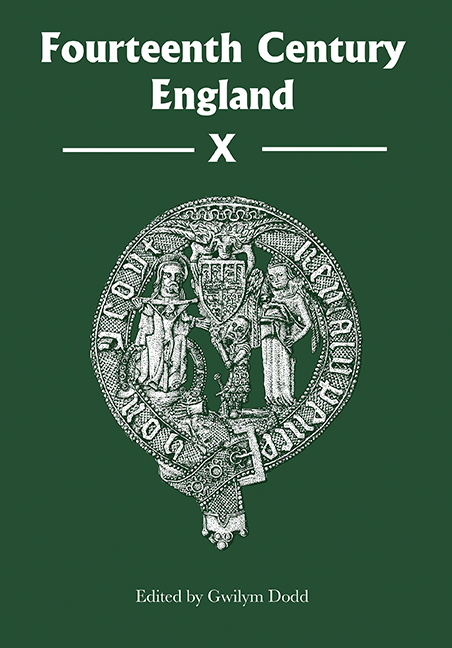Book contents
- Frontmatter
- Contents
- List of Illustrations
- Contributors
- Preface
- Abbreviations
- ‘Bought by the King Himself’: Edward II, His Chamber, His Family and His Interests in 1325–26
- Parliament in the Reign of Edward II
- The Representation of the Clergy in Parliament
- Feeding Mars: Military Purveyance in the Long Fourteenth Century
- ‘Unnatural in Body and a Villain in Soul’: Rape and Sexual Violence towards Girls under the Age of Canonical Consent in Late Medieval England
- Marriage and Inheritance: The Element of Chance in the Development of Lay Estates in the Fourteenth Century
- Mary Percy and John de Southeray: Wardship, Marriage and Divorce in Fourteenth-Century England
- Richard II's Kingship at St Stephen's Chapel, Westminster, 1377–99
- Bodies in Constant Motion: The Burials and Reburials of the Plantagenet Dynasty, c. 1272–1399
- Fourteenth Century England Issn 1471–3020
The Representation of the Clergy in Parliament
Published online by Cambridge University Press: 03 July 2019
- Frontmatter
- Contents
- List of Illustrations
- Contributors
- Preface
- Abbreviations
- ‘Bought by the King Himself’: Edward II, His Chamber, His Family and His Interests in 1325–26
- Parliament in the Reign of Edward II
- The Representation of the Clergy in Parliament
- Feeding Mars: Military Purveyance in the Long Fourteenth Century
- ‘Unnatural in Body and a Villain in Soul’: Rape and Sexual Violence towards Girls under the Age of Canonical Consent in Late Medieval England
- Marriage and Inheritance: The Element of Chance in the Development of Lay Estates in the Fourteenth Century
- Mary Percy and John de Southeray: Wardship, Marriage and Divorce in Fourteenth-Century England
- Richard II's Kingship at St Stephen's Chapel, Westminster, 1377–99
- Bodies in Constant Motion: The Burials and Reburials of the Plantagenet Dynasty, c. 1272–1399
- Fourteenth Century England Issn 1471–3020
Summary
In late medieval England, clergy of all ranks, from archbishops to parochial clergy, sent proctors to parliament, whether as representatives (delegates) of constituency groups – the diocesan clergy and cathedral chapters – or as deputies for the individuals who were called to appear in person. The individuals were bishops, parliamentary abbots, archdeacons, and cathedral deans. Bishops and abbots received individual writs of summons, while archdeacons and deans were called indirectly through their bishops. This clerical element in the personnel of parliament has received comparatively little attention, but there is a series in The National Archives, Special Collection 10, on that very subject, and this essay aims to draw attention to the riches it contains. Most evidence concerns those higher clergy who were summoned to parliament individually, and within that category the letters of abbots predominate.
Neglect of these parliamentarians may have several causes, but the likeliest reason is that so much material recording their presence has been lost. Proctors attending parliament on the clergy's behalf carried letters of appointment which they handed to the parliamentary clerks who then compiled proxy rolls containing this information. Those rolls were already decayed by the early seventeenth century, and later disappeared completely. A single surviving example is the list of those sending proctors to the Carlisle parliament of January 1307, and the names of their proctors. It was copied from the parliament rolls into the Vetus Codex, a collection of documents assembled during Walter Stapeldon's time as treasurer in the 1320s. This contains ninety-three letters, including ten from bishops, seventeen from archdeacons, nineteen from cathedral deans (or priors of monastic cathedrals) and their chapters in various combinations, thirty-four from abbots, and thirteen from representatives of the lower clergy.
The existence of this list shows us something of what has been lost. But fortunately, by luck, and by no discernible archival policy, large numbers of the original proxy appointments survive, along with a smaller number of the letters which proctors carried with them during the parliament as proof of their status. Dating from about 1248 to 1447, and again from 1523 to 1536, there are 2,731 appointments, nearly all in TNA SC 10. Most of these commissions were issued by members of what came to be called the clerical peerage: bishops and abbots.
- Type
- Chapter
- Information
- Fourteenth Century England , pp. 47 - 66Publisher: Boydell & BrewerPrint publication year: 2018



